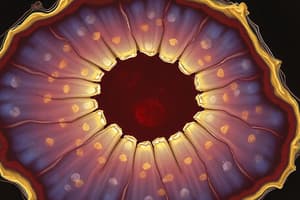Podcast
Questions and Answers
What is the primary difference between simple and stratified epithelia?
What is the primary difference between simple and stratified epithelia?
- Simple epithelia consist of a single layer of cells. (correct)
- Stratified epithelia provide barriers to water.
- Stratified epithelia are primarily involved in communication.
- Simple epithelia consist of multiple layers.
Which cell shape is associated with providing protection against friction and injury?
Which cell shape is associated with providing protection against friction and injury?
- Pseudostratified cells
- Cuboidal cells
- Columnar cells
- Squamous cells (correct)
What feature distinguishes multilayered epithelia from simple epithelia?
What feature distinguishes multilayered epithelia from simple epithelia?
- Lower layers of multilayered epithelia regenerate the upper layers. (correct)
- Multilayered epithelia have cuboidal cells only.
- Upper layers in multilayered epithelia are responsible for regeneration.
- Multilayered epithelia provide a gateway for communication.
Which type of epithelial cell serves primarily as a barrier against water and toxins?
Which type of epithelial cell serves primarily as a barrier against water and toxins?
What is a common characteristic of columnar epithelial cells?
What is a common characteristic of columnar epithelial cells?
What distinguishes connective tissue from epithelial tissue?
What distinguishes connective tissue from epithelial tissue?
What is a characteristic feature of glands that secrete hormones?
What is a characteristic feature of glands that secrete hormones?
Which of the following statements about connective tissue is true?
Which of the following statements about connective tissue is true?
Where does mesenchyme originate from in the human body?
Where does mesenchyme originate from in the human body?
What role do collagen fibers play in connective tissue?
What role do collagen fibers play in connective tissue?
Flashcards are hidden until you start studying
Study Notes
Epithelia
- Epithelial cells form continuous sheets, functioning as coverings or linings in the body.
- Glands responsible for hormone secretion and protein production are composed of epithelial tissue.
- Epithelia classifications include simple (single layer) and stratified (multiple layers), indicating their functional roles.
Classification of Epithelia
- Cell shapes in epithelia are categorized as:
- Squamous: Flattened, scale-like cells.
- Cuboidal: Cube-shaped cells.
- Columnar: Taller, column-like cells.
- Importance of Layering:
- Multilayered epithelia provide protection against friction and injury.
- Single-layered epithelia facilitate communication and regulated transport of substances.
Cell Structure and Specializations
- Macula Adherens (Desmosome): Connects adjacent cells, providing structural stability and cell-to-cell adhesion via cadherins, which require calcium for binding.
- Terminal Web: Involves actin and spectrin, facilitating cell surface stability and interactions.
- Intermediate Filaments: Anchor at desmosomes, contributing to the mechanical integrity of epithelial tissues.
Cell Surface Specializations
- Microvilli: Appear as small projections that significantly increase surface area for absorption, especially in intestinal and kidney epithelial tissues.
- Brush Border: Features striated borders with enzyme-containing membranes to enhance absorption efficiency.
- Core Actin Filaments: Stabilized by anchoring proteins at microvilli tips, bound to myosin along lateral walls to maintain structure and prevent depolymerization.
Junctions and Adhesion
- Special junctions, such as desmosomes, enhance adhesion between epithelial cells, maintaining tissue integrity.
- Receptors and Basal Lamina: Important for cellular signaling and attachment to the underlying connective tissue.
Importance of Epithelial Cell Characteristics
- The arrangement and shape of epithelial cells correlate with their specific functions, highlighting the relationship between structure and purpose in biological systems.
Studying That Suits You
Use AI to generate personalized quizzes and flashcards to suit your learning preferences.




